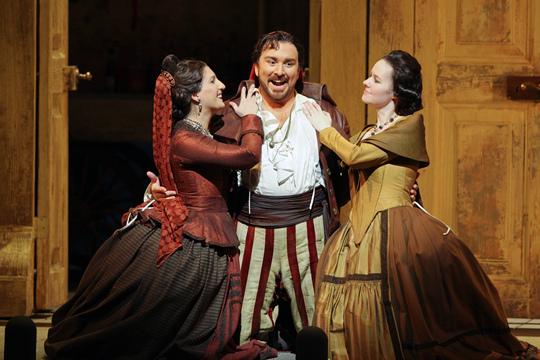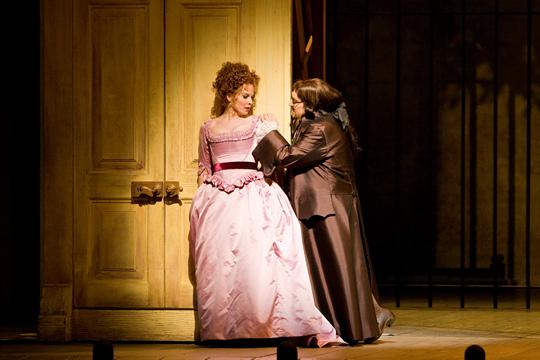Other Links
Editorial Board
- Editor - Bill Kenny
- London Editor-Melanie Eskenazi
- Founder - Len Mullenger
Google Site Search
SEEN
AND HEARD INTERNATIONAL OPERA REVIEW
Rossini,
Il
Barbiere di Siviglia : Soloists, New York Metropolitan Opera
Chorus and Orchestra conducted by Frédéric Chaslin. Metropolitan
Opera House, New York, 12.1.2008 (PD)
The much anticipated Met debut of Elīna Garanča was not the only
story on opening night, as there were rumors that at least one
cast member was too ill to perform. “We regret to inform you that
José
Manuel Zapata is not feeling entirely well, but
wishes to go on with the show,” said a Met official in a
pre-curtain announcement. He asks for you understanding.” He
needn’t have. This was the first time for the Spanish tenor on the
Met stage too, and the audience knew that a sore throat
would only be made worse by a case of the nerves. Stage fright? As
they say in a neighboring borough, “forgetaboutit.”
Last season, Met subscribers heard German soprano Diana Damrau,
sing the role of Rosina in another Sher production, and by all
accounts she was very good. But it’s a mezzo voice that Rossini was
writing for, and Garanča has a molto instrument. The Latvian diva
has all the makings of a superb actress as well, demonstrating
that “Una voce poco fa,” is an aria that can indeed be sung while
languishing on a daybed. Her characterization of our heroine is
camped up a bit in other ways, but she is never diminished or
ridiculed. This is a woman clearly to be reckoned with, and Garanča plays it straight enough to convince us that she is a
femme with fatale proclivities. Those who had seen her portray Dorabella in
Così fan tutte in
Cast:
Rosina: Elina Garanca
Count Almaviva: José Manuel Zapata
Figaro: Franco Vassallo
Dr. Bartolo: Bruno Praticò
Don Basilio: Peter Rose
Production:
Bartlett Sher (director)
Michael Yeargan (sets)
Catherine Zuber (costumes)
Christopher Akerlind
(lighting)

Figaro: Franco Vassallo
And speaking of 'burros', wasn’t that an adorable animal used in
the opening scenem choreographed by Bartlett Sher? The animal –
something of a cliché prop, granted – was escorted out by Italian
baritone, Franco Vassallo, who also led a caravan of admirers
about as he rejoiced in self praise. A better Figaro is hard to
find, as Vassallo has tremendous comic energy and all the right
tools to carry the role through to its dynamic conclusion. He made
a grand entrance, driving his “barber’s” wagon through the village
streets of Seville, fairly shouting “La ran la le ra…Largo al
factotum.”

Rosina: Elina Garanca
The burro was not the only domestic pet on stage. A small lapdog
was also featured as Dr. Bartolo’s faithful companion. I make
mention of the animal only because it had the potential of
stealing the scene away from Bruno Praticò. But the big forceful
Italian bass would have none of it. Here is comic genius
personified. His brilliant performance was applauded and cheered
from beginning to end. Even his canine companion was impressed, as
it responded cheerfully to every animated command and signal it
was given.
Kudos too, for French conductor, Frédéric Chaslin, who guided the
cast, chorus and orchestra with aplomb. He is not a flamboyant
showman, but does wield the baton with muscular confidence. And in
the end it may have been the heroic performance of Zapata that is
most memorable. Struggling with a bad cold, he fought his way
through the demanding recitative and belted out a sensitive (if
not particularly forceful) “Ecco ridente” that brought the house
down.
Paul Duclos
Pictures © Marty Sohl / Metropolotan Opera
Back
to Top
Cumulative Index Page
